
"2024 Approved Masterpiece Episodes for Airwaves"

Masterpiece Episodes for Airwaves
A radio drama is a fictional work that is broadcast on the radio. It is entirely acoustic, with no visual elements. The dialogue, sound effects, and music help the audience understand what is going on. They shape the story by imagining the settings and characters.
Part 1. Everything about Radio Drama Scripts
A radio play script is written in a specific format that allows the playwright to convey how sound and music will be used in the performance. For example, one page of dialogue equals about one minute of airtime. Each scene should be labeled with a number. Normally, lines are double-spaced.
1. What are radio drama scripts?
A radio drama is a presentation of a fictional work distributed on the radio. It is completely acoustic with no visual components. The audience understands what is happening through dialogue, sound effects, and music. They give form to the story by visualizing the environment and characters.
Audio dramas can be works of fiction written expressly for radio broadcasting or podcasting. Alternatively, they can be adapted from plays, novels, short stories, etc.
Now there is often a need to write audio dramas specifically for radio, as stage plays rely on what the audience can see on stage.
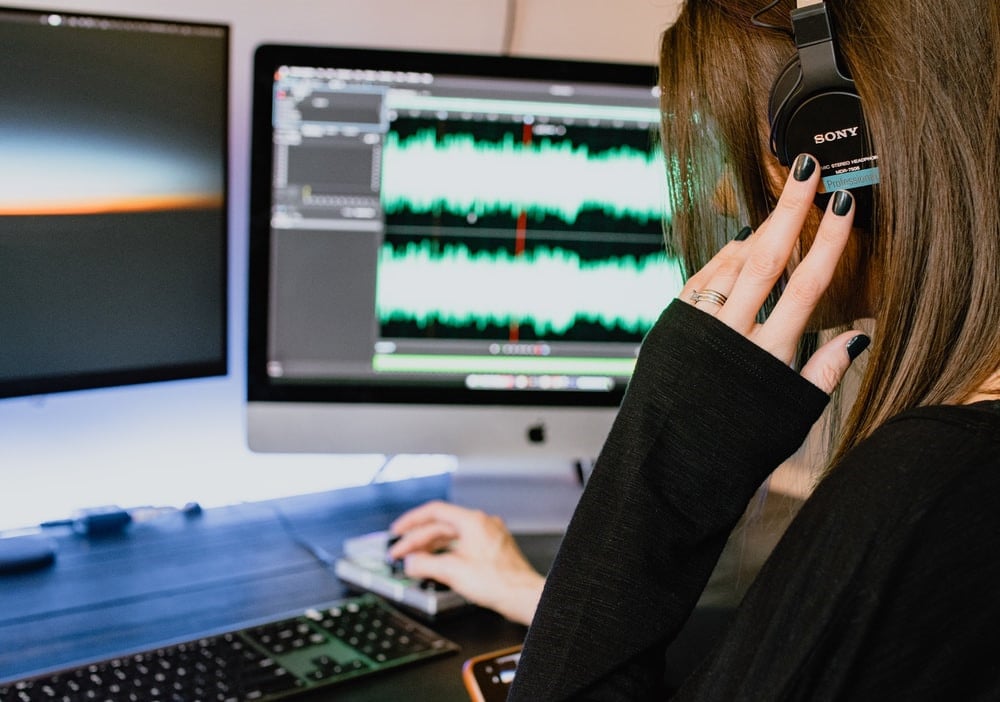
2. Elements of radio drama
Drama’s elements are its fundamental building blocks. The elements of drama are defined as the “key ingredients” of drama in the Arts in New Zealand Curriculum.
Radio drama contains the same elements as stage drama:
- Role: characters in the game
- Time: when the event takes place
- Place: where the action takes place
- Action: what happens in the drama?
- Tension: conflict between characters and their surroundings
- Focus: the thoughts, feelings, or characters the playwright wants us to focus on at a particular moment.
In radio drama, however, the playwright must inform us of the elements through various means, because we cannot get the information with our eyes. Radio drama is essentially heard, not seen.
3. Radio drama features
The following are Radio Drama Features:
- Radio drama uses sound to convey ideas to the audience. Audio can be in the form of dialogue, sound effects, or music.
- Actors can play more than one role from moment to moment because only the voice needs to be changed.
- Actors only use voice to express a character. They don’t need to use action, gestures, or facial expressions because the audience can’t see them.
- There is no need for blocking or stage business in radio drama. However, actors may need to plan their movement to and from the microphone.
- Radio playback can be set almost anywhere. There are no physical limits to overcome. Settings can easily be created with music and sound effects.
- Radio drama contains a lot of dialogue. Since we can’t see what the actors are doing, they have to tell us what’s going on. The writer has to find ways for the characters to comment on where they are and what they and others are doing.
- Radio scenes are often shorter than stage plays.
- Radio drama must not be “live” in front of an audience. Radio drama is usually recorded and played back to an audience at a different time. This means that, just like in a movie, scenes don’t have to be played back-to-back and can be played more than once to get the best shot if needed. Drama can also be edited, and audio added.
- Actors do not need to learn their lines. The actors can read their lines from the script because the audience can’t see it. Actors must be familiar with their lines and rehearsed how they will use their voice to tell the audience about the character and the action.
- Radio drama usually features a small cast. A small number of characters are used in each scene because it is too difficult for the audience to distinguish between voices if there are many characters. The audience can also forget that a character is “on stage” if they don’t speak for a while because they can’t be seen. Because of this, the characters must speak quite often and be involved in the plot.
- Radio drama is well suited for monologue and for plays where the setting is limited and physical action is not important, such as in a prison cell or cave.
Part 2. 3 tips for writing radio drama scripts
Scriptwriting is a fundamental technique of creativity, whether for content production, copywriting, or art direction. Florida International University offers the Master of Science Creative Track in collaboration with the world-renowned portfolio school Miami Ad School. If you want to become a copywriter, the program is designed to hone your writing skills for a variety of communication styles and media, such as writing for video and audio content, TV and radio commercials, and the web.
Here are some tips to become a better audio-only content writer.
Writing a script allows you to control the content, structure, and flow of the program. If the show is unscripted and organic, the host will have talking points for reference. In addition to the script, you can also play with music and sound effects.
1. Keep your scripts clear
Write the script while keeping it as simple as possible. Don’t fill your sentences with words that don’t add to what you’re trying to say.
Reading from a script can make you sound a little unnatural, as well as stiff and robotic. That is a huge error. When read aloud, the script should sound natural. A more formal approach and style can result in a show that sounds unnatural and is boring.
Radio has long been a popular form of entertainment, and radio dramas or plays are an excellent way for writers to express themselves. Original stories or adaptations of novels or plays can be used in radio dramas. Radio plays, like stage plays, have scenes, sequences, and acts, but they are not always structured the same way. Radio drama allows for a great deal of flexibility and creativity, and the medium of sound is also unique.
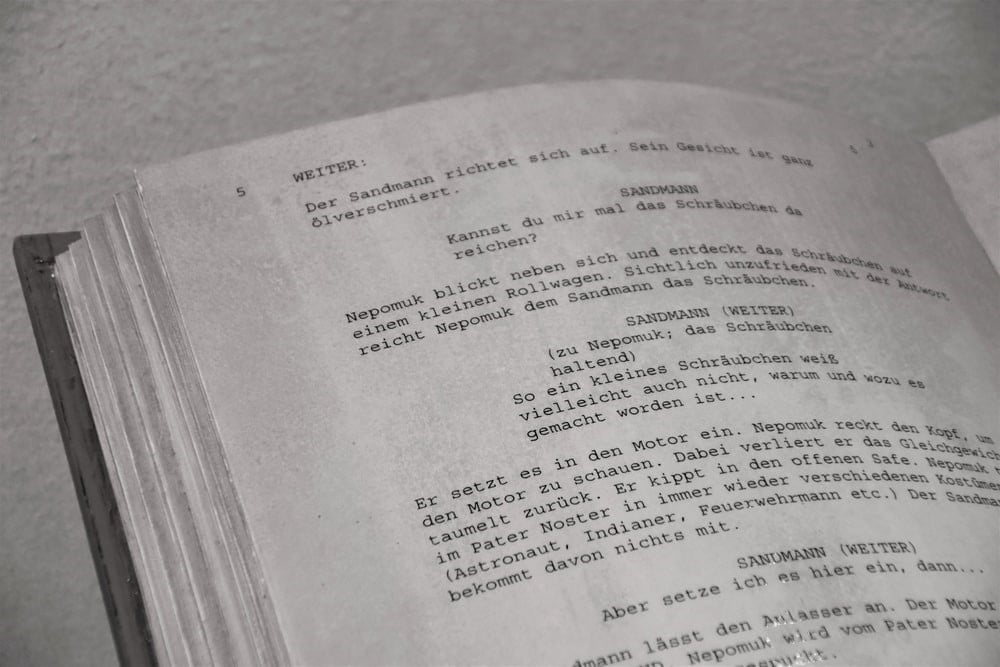
Novelists and screenwriters will need to alter their writing style to write for the ear rather than the eye. Listeners cannot read the previous line or skip ahead. Everything must make sense and be visualized by the listener at that time. To convey action and drama, use dialogue, sound effects, music, and even silence. This can be completed by including specific audio cues in your script so that the show’s creators understand your vision. Keep the script as brief as possible. There can never be too much prose or long-winded dialogue in radio plays. Everything must be brief, succinct, and to the point.
2. Jump right into the action
Radio drama can be more difficult because it must immediately engage listeners, or they will lose interest and switch stations or channels. The first two minutes are crucial, so start your drama at the appropriate point in the story. The rule of thumb in the radio industry is ‘arrive late, leave early.’ This means you should enter the story at a later stage when the action has begun or when a crisis has occurred. Unlike books and movies, setting, building, and background details are not required. You can save the necessary details for later in the play.
Radio scripts, like scripts, must conform to industry standards for radio program producers to find the script usable. Include scripts for music, sound effects, silence, dialogue, and other audio needs in the game so that producers can see how the script will translate into the show. Include information for the actors as well, so they can bring your vision to life. For example, use adjectives to describe how they should sound when reading their lines - sad, angry, laughing, and so on. Also, keep the number of characters to a minimum and give each one a distinct voice and style.

3. Make It Sound Conversational
Whether fully scripted or not, audio programs are at their best when they sound natural. Make sure your grammar is concise and to the point so that you can improvise and expand on what you’ve written.
Write like you talk. A well-written script, read word for word, should be invisible to the listener. Your script must sound natural and relaxed. Read the script out loud or have someone read it.
Can’t find people ready to help? No problem, paste the script into your text-to-speech program. Wondershare Filmora has a text-to-speech (TTS) feature. If you’re gasping in the middle of a sentence, shorten your sentences.
If the words are too difficult to express well or the meaning might be lost on the listener, try to use simple words whenever possible. Also, use free online tools like Hemingway Editor to help you identify complex sentences.
Part 3. Some famous radio dramas
- The Archers
The Archers is also a BBC Radio 4 show that has aired since 1950. It’s a radio soap opera set in the fictitious village of Ambridge. The daily drama of the Archers’ family farm entertains listeners.
Podcast: The Archers podcast
No. of episodes: 19,729 (as of 4 July 2022)
Genre: Radio drama
Home station: BBC Light Programme (1951–1967); BBC Radio 4 (1967–present)
Original release: 1 January 1951 – present
Awards: The show was a huge success, winning the National Radio Awards’ ‘Most entertaining programs of the Year’ award jointly with Take It from Here in 1954, and winning it outright in 1955, when the audience was reported to have peaked at 20 million.
Watch all the archers’ episodes here:
- We’re Alive
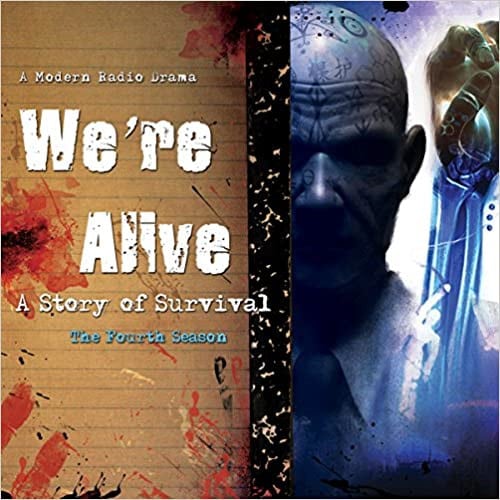
We’re Alive is one of the most well-known podcast audio dramas on the web right now, with 166 episodes spread across four seasons. The post-apocalyptic audio drama follows a group of survivors as they try to survive a zombie apocalypse.
The drama first aired on iTunes in 2009, and its final season premiered in 2014. The show’s compiled season version is now available from Wayland Productions.
No. of episodes: 143
Genre: Radio drama
Created by: Kc Wayland, Grayson Stone
No of Seasons: 4
Original release: May 04, 2009 – July 29, 2014
Awards: We’re Alive was nominated for Best Audio Drama in the Audio Publishing Awards in 2012. It was named “Best of 2012” in the iTunes Arts category the same year. The series has also won the following awards:
- 4th Annual Dead Letter Award
- 2009 Gold Ogle Award
- 2010 Silver Ogle Award
- Parsec Award Winner Best Speculative Fiction Audio Drama Long Form 2014
- Parsec Award Finalist Best Speculative Fiction Audio Drama Long Form 2010 2011, 2012, and 2013
Watch all we’re alive episodes here:
Part 4. Best websites to download radio dramas
If you are looking for good websites to download free radio dramas, then these are the websites you are looking for:
1. Simply Scripts
Simply Scripts is indeed a database of thousands of downloadable scripts, movie scripts, screenplays, and transcripts from current, classic, and possibly upcoming movies, television shows, anime, unproduced, and radio shows. A resource for screenwriters.
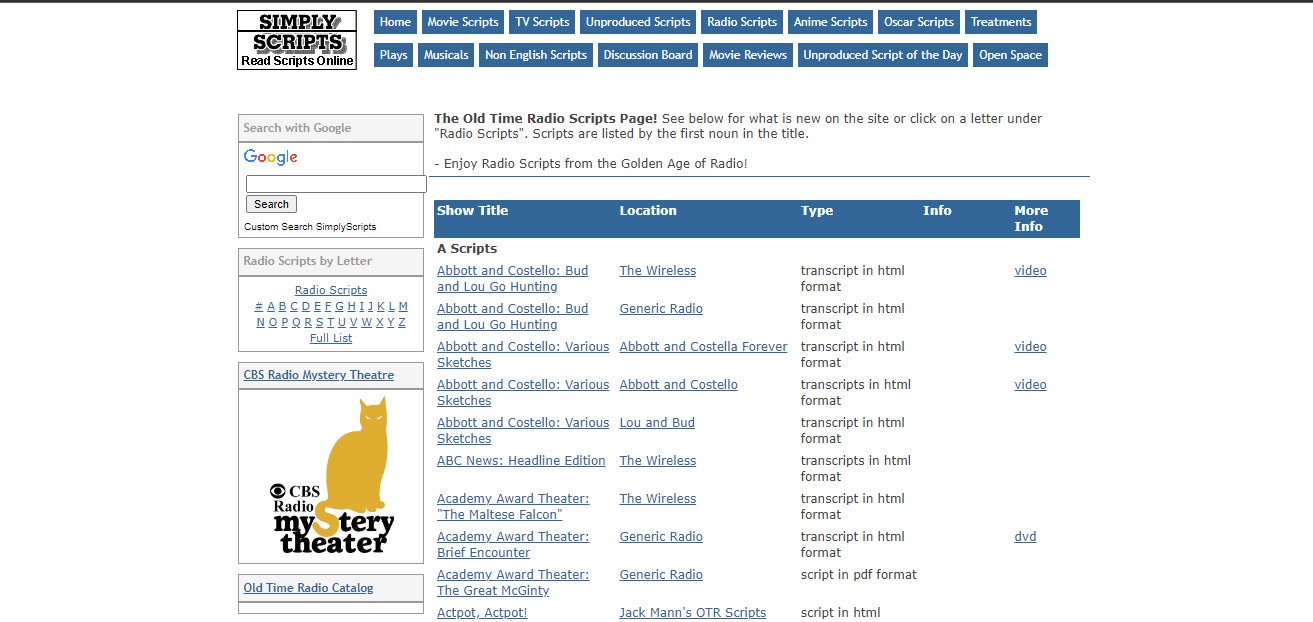
2. BBC Radio Shows
Nearly 35 million people listen to BBC Radio each week. The BBC provides a range of services aimed at providing listeners with high-quality programming, regardless of their interests or mood.
BBC Radio features:
- Music radio broadcasts on Radio 1, Radio 1Xtra, Radio 2, 6 Music, and Asian Network.
- Radio 4’s speech, drama, analysis, and arts programming
- 6 national radio services (Radio Scotland, Radio nan Gàidheal, Radio Ulster, Radio Foyle, Radio Wales, Radio Cymru)
- Radio 4 Extra features comedy, drama, and children’s programming.
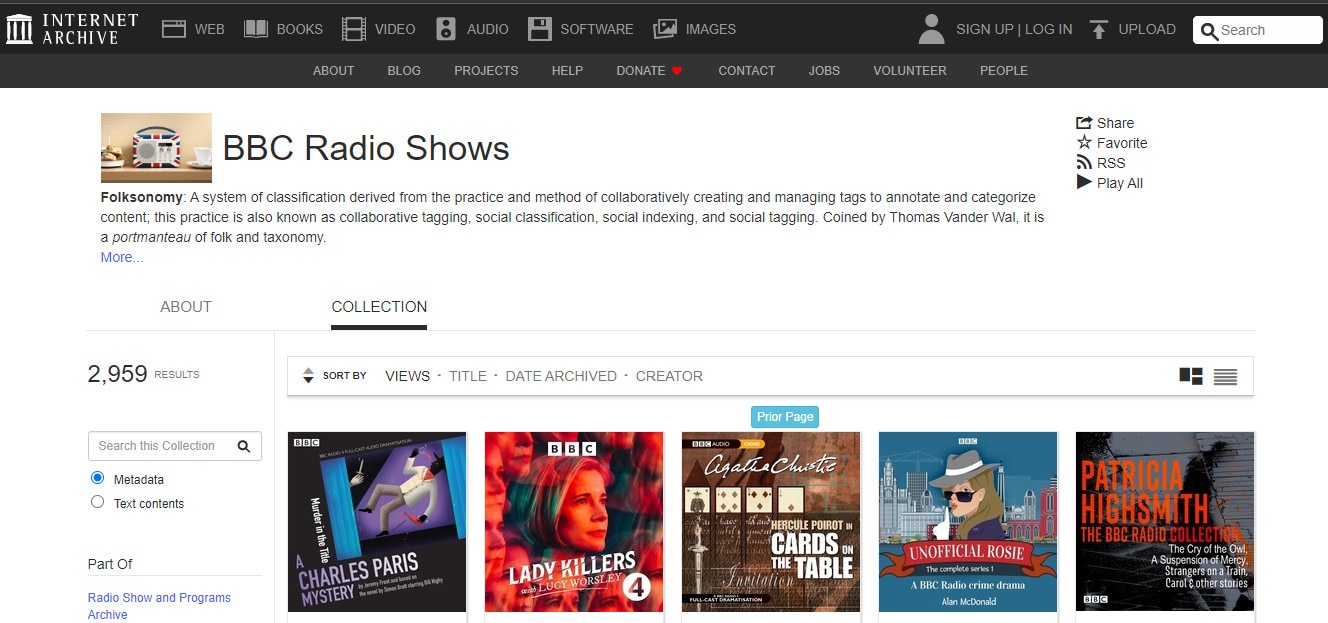
Conclusion
This article will teach you everything you need to know about radio and audio drama scripts. Continue reading to learn more about radio dramas and to become one of the best radio drama writers. Radio dramas can supplement your radio station’s content or lead to independent podcast series. Don’t fall into the trap of believing that you’ll improve your writing skills. You must devote sufficient time to listening to previous works. Discover what makes an audio drama great.
Free Download For Win 7 or later(64-bit)
Free Download For macOS 10.14 or later
- We’re Alive

We’re Alive is one of the most well-known podcast audio dramas on the web right now, with 166 episodes spread across four seasons. The post-apocalyptic audio drama follows a group of survivors as they try to survive a zombie apocalypse.
The drama first aired on iTunes in 2009, and its final season premiered in 2014. The show’s compiled season version is now available from Wayland Productions.
No. of episodes: 143
Genre: Radio drama
Created by: Kc Wayland, Grayson Stone
No of Seasons: 4
Original release: May 04, 2009 – July 29, 2014
Awards: We’re Alive was nominated for Best Audio Drama in the Audio Publishing Awards in 2012. It was named “Best of 2012” in the iTunes Arts category the same year. The series has also won the following awards:
- 4th Annual Dead Letter Award
- 2009 Gold Ogle Award
- 2010 Silver Ogle Award
- Parsec Award Winner Best Speculative Fiction Audio Drama Long Form 2014
- Parsec Award Finalist Best Speculative Fiction Audio Drama Long Form 2010 2011, 2012, and 2013
Watch all we’re alive episodes here:
Part 4. Best websites to download radio dramas
If you are looking for good websites to download free radio dramas, then these are the websites you are looking for:
1. Simply Scripts
Simply Scripts is indeed a database of thousands of downloadable scripts, movie scripts, screenplays, and transcripts from current, classic, and possibly upcoming movies, television shows, anime, unproduced, and radio shows. A resource for screenwriters.

2. BBC Radio Shows
Nearly 35 million people listen to BBC Radio each week. The BBC provides a range of services aimed at providing listeners with high-quality programming, regardless of their interests or mood.
BBC Radio features:
- Music radio broadcasts on Radio 1, Radio 1Xtra, Radio 2, 6 Music, and Asian Network.
- Radio 4’s speech, drama, analysis, and arts programming
- 6 national radio services (Radio Scotland, Radio nan Gàidheal, Radio Ulster, Radio Foyle, Radio Wales, Radio Cymru)
- Radio 4 Extra features comedy, drama, and children’s programming.

Conclusion
This article will teach you everything you need to know about radio and audio drama scripts. Continue reading to learn more about radio dramas and to become one of the best radio drama writers. Radio dramas can supplement your radio station’s content or lead to independent podcast series. Don’t fall into the trap of believing that you’ll improve your writing skills. You must devote sufficient time to listening to previous works. Discover what makes an audio drama great.
Free Download For Win 7 or later(64-bit)
Free Download For macOS 10.14 or later
Also read:
- [New] Best Video Experts in Photo-Song Collaboration for 2024
- [New] In 2024, Superior Video Capture Systems - The #1 to #18 List
- [New] Secure Techniques to Boost Speed in Spotify Listening
- [Updated] Samurai's Modern Journey 10 Games Similar to Ghost of Tsushima for 2024
- 2024 Approved Best Meme Generator App Downlaod
- 2024 Approved Brightness and HD in Harmony A Fit for HDR?
- 2024 Approved JokeJigsaw Creator Humor Graphic Tool
- 2024 Approved Navigating Through FFXP Your Step-by-Step Handbook
- 2024 Approved The Essence of UAVs Understanding Their Mechanics & Use
- Android Safe Mode - How to Turn off Safe Mode on Lava Blaze Curve 5G? | Dr.fone
- How To Unlock iPhone 6 3 Ways To Unlock
- In 2024, Apple ID Locked or Disabled From iPhone 11 Pro Max? 7 Mehtods You Cant-Miss
- Title: 2024 Approved Masterpiece Episodes for Airwaves
- Author: Timothy
- Created at : 2025-02-27 00:40:40
- Updated at : 2025-03-01 03:38:17
- Link: https://article-files.techidaily.com/2024-approved-masterpiece-episodes-for-airwaves/
- License: This work is licensed under CC BY-NC-SA 4.0.